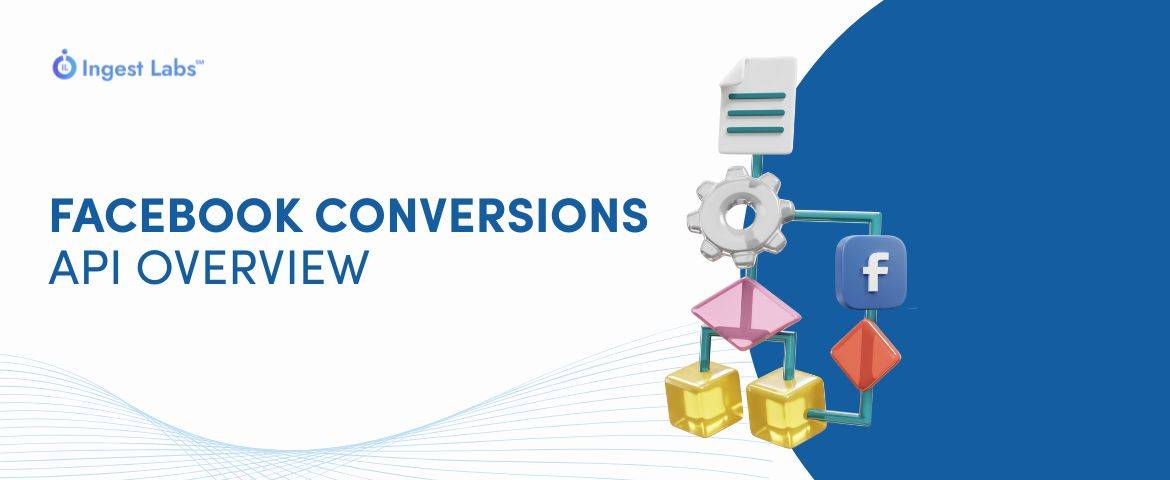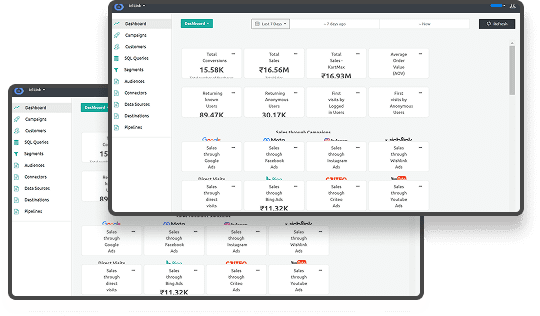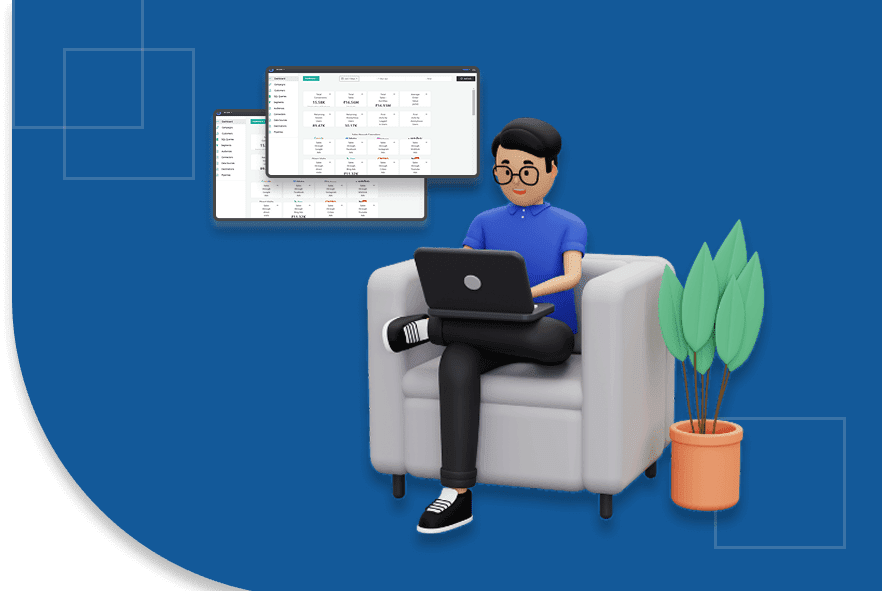Understanding the Facebook Conversions API
What if your campaign data is only telling half the story?
As digital privacy measures increase, traditional browser tracking is limited. Advertisers using Facebook's Conversions API with the Meta Pixel have seen a 13% improvement in cost per action. In comparison, small businesses report a 30% increase in attributed purchases and a similar reduction in price.
Facebook Conversions API facilitates a direct connection between marketing data and Meta, enabling more accurate tracking and optimization of ad campaigns. By integrating this tool, businesses can enhance their advertising strategies, resulting in improved performance and a higher return on investment.
This blog provides a comprehensive overview of the Facebook Conversions API, detailing its functionality, benefits, and integration methods to optimize your marketing efforts.
What Is Facebook Conversions API?
Facebook Conversions API (CAPI) is designed to help businesses track and optimize their digital marketing campaigns while keeping user data private. Unlike traditional methods that rely on cookies for tracking, CAPI allows businesses to send conversion data directly from their server to Meta, providing a more reliable and secure way to measure user interactions across websites and apps.
CAPI offers an alternative to the Facebook Pixel by enabling server-side tracking. It helps marketers get a clearer picture of customer behavior and interactions. With rising concerns about data privacy, CAPI’s server-side nature ensures compliance with privacy regulations, including GDPR and CCPA. By shifting data processing to the server, you avoid the limitations posed by browser restrictions, such as those imposed by third-party cookies.
How Facebook Conversions API Works
The Facebook Conversions API helps businesses track user actions by collecting data directly from the server, rather than relying on the browser, which can be blocked by ad blockers or privacy settings.
Here’s how it works step by step:
1. Event Tracking
When a user interacts with your website or app, such as purchasing or signing up for a newsletter, your server captures that event. This tracking happens on the server side, meaning it’s not dependent on browser cookies or JavaScript, which the user can block or delete. This approach helps capture more meaningful user interactions, even if they’ve opted out of cookie tracking.
2. Data Transmission
Once the event is recorded on your server, the data is securely transmitted to Meta via the Conversions API. Unlike browser-based tracking, where the data might be lost due to privacy settings or cookie-blocking technologies, this server-side method ensures that data is delivered directly to Facebook in real-time. This means there’s less risk of data loss, and you can rely on accurate tracking of user behavior across platforms.
3. Meta Processing
Once Facebook receives the conversion data, it processes the information to update your campaign’s performance metrics. The data is then used to optimize ad delivery, improve targeting, and adjust your campaigns' performance based on more reliable and complete information. This helps improve the precision of your ad strategy and boosts your return on ad spend (ROAS).
By combining server-side tracking with browser-based methods, Facebook Conversions API ensures a more accurate and comprehensive view of user actions.
Next, we’ll explore how the iOS 14 updates affect tracking and how the Conversions API can help manage these changes.
Facebook Conversions API and iOS 14: Why It Matters
Apple's iOS 14 update introduced significant changes to user privacy with the App Tracking Transparency (ATT) feature, which allows users to opt out of being tracked across apps and websites. This shift has made it more difficult for businesses to track the true effectiveness of their digital campaigns, as many users have chosen not to share their data for tracking purposes.
This is where Facebook Conversions API becomes important:
- Server-side tracking bypasses these privacy restrictions, allowing businesses to continue tracking user actions without being affected by iOS 14 changes.
- Even if users opt out of tracking through the ATT prompt, conversion data can still be gathered directly from the server, ensuring more accurate insights.
Using CAPI, businesses can maintain reliable campaign measurement and performance, despite the increased privacy controls on iOS devices. Let's examine how CAPI compares to the Facebook Pixel and explore how they can work together.
Key Differences between Facebook Conversions API vs. Facebook Pixel
Facebook Pixel and Facebook Conversions API are essential tools for tracking and optimizing your digital marketing campaigns. However, they operate differently, and understanding these differences can help you determine the best way to implement them for more accurate tracking.
Here’s a breakdown of the key differences:
| Feature | Facebook Pixel | Facebook Conversions API (CAPI) |
| Data Collection Method | Collects data through the browser (client-side) | Collects data directly from the server (server-side) |
| Reliability | Can be blocked by browser settings or ad blockers | More reliable, especially when cookies are blocked or users opt out of tracking |
| Implementation | Requires adding a JavaScript code to your website | Requires server-side integration with your backend |
| Data Privacy | Dependent on cookies, which may violate privacy regulations | Compliant with privacy laws (e.g., GDPR, CCPA), as it uses first-party data |
| Tracking Accuracy | Less accurate if cookies are blocked or data is deleted | More accurate because it bypasses browser restrictions and tracks without cookies |
| User Control | Users can block tracking or delete cookies | Tracking is independent of browser controls, giving businesses more complete data |
| Event Tracking | Tracks user behavior through browser actions | Tracks user behavior via server data, which is more comprehensive |
Using the Facebook Pixel and Conversions API together can provide a more complete picture of your campaign’s performance. The Pixel will still capture events from users who allow cookies, while the Conversions API ensures that events are recorded from server-side actions, even when cookies are blocked.
This combination of methods gives you the best of both worlds: a more reliable tracking system and the assurance that your campaigns are running at full capacity.
Why Businesses Should Use Facebook Conversions API
Integrating the Facebook Conversions API (CAPI) into your marketing strategy offers several key advantages that can enhance your tracking capabilities and overall campaign performance.
Here’s why businesses should make the switch to CAPI:
Improved Accuracy
Server-side tracking through CAPI gives you a more comprehensive and reliable view of user actions. Unlike cookie-based monitoring, which can be blocked or deleted, CAPI ensures that conversion data is captured regardless of the user’s privacy settings.
- Accurate Tracking Across Devices: Because CAPI tracks data on the server side, it can collect actions that happen across multiple devices, creating a fuller picture of user behavior.
- No Data Loss: Users can delete cookies, which means important conversion data could be lost. CAPI bypasses this, ensuring the data is captured at the server level.
- Better Cross-Platform Tracking: CAPI tracks users across different platforms, ensuring you don’t miss out on valuable conversion data from interactions outside of a single device or platform.
Better Attribution
One of CAPI's most important benefits is its ability to provide more reliable and accurate attribution for your campaigns. By collecting data directly from the server, CAPI ensures you can more easily associate conversions with the correct campaigns and user actions.
- Clearer Campaign Insights: CAPI sends accurate conversion data directly to Meta, providing clearer insights into which campaigns drive the most conversions.
- Avoid Attribution Gaps: Browser-based tracking often results in gaps, especially with users who block cookies. CAPI fills in these gaps by collecting data from the server-side.
- Improved Return on Ad Spend (ROAS): With better attribution, you can adjust your campaigns for maximum performance, ultimately improving your ROAS by making more informed decisions.
Privacy Compliance
As privacy regulations like GDPR and CCPA become stricter, businesses must prioritize compliance. CAPI ensures data collection aligns with these laws, helping companies to avoid penalties and maintain customer trust.
- First-Party Data: CAPI sends first-party data, which means it only collects data directly from users who have interacted with your site. This ensures greater privacy compliance.
- User Consent: CAPI respects user consent preferences, allowing businesses to track data only from users who have explicitly given their consent, thereby staying compliant with privacy regulations.
- Privacy by Design: CAPI's server-side tracking approach ensures the ethical collection of data and maintains the confidentiality of user information.
By integrating CAPI, you can ensure better campaign accuracy, more reliable attribution, and full compliance with growing privacy laws. In the next section, we’ll explore how to integrate CAPI with your CRM system for even more powerful campaign tracking and data management.
Why is connecting CRM data with Facebook Conversions API the smart approach?
Connecting your CRM data with Facebook Conversions API can significantly elevate your marketing efforts. By merging first-party CRM data with server-side tracking, you can improve the accuracy of your campaigns, optimize customer engagement, and ultimately improve your Return on Ad Spend (ROAS).
Here’s why integrating CRM data with CAPI works so well:
Seamless Data Flow
When your CRM data is synced with CAPI, you ensure that conversion events are more comprehensive and captured in real time. This smooth data transfer eliminates discrepancies and ensures you work with the most up-to-date customer information.
- Real-Time Data Transfer: Data flows directly from your CRM to Meta through CAPI, making it quicker and more accurate than traditional cookie-based tracking.
- Accuracy Across Platforms: Integration ensures that data from multiple sources is unified, accurately reflecting customer behaviors and interactions.
Better Campaign Performance
By combining the insights from CRM and server-side tracking, you get a fuller picture of your audience’s behavior, which allows for more informed decisions and better campaign optimization.
- More Refined Insights: With a complete set of conversion data, including CRM data, you can optimize campaigns more precisely.
- Actionable Performance Data: Using CRM and CAPI, you can measure the performance of different audience segments and adjust campaigns accordingly.
Advanced Segmentation
CRM data provides detailed customer insights, which allow you to segment audiences more effectively when combined with server-side tracking. This helps you target the right people with the right message.
- Refined Audience Segmentation: Use CRM data to create specific audience segments based on purchase behavior, browsing patterns, and other relevant metrics.
- Improved Campaign Targeting: Better segmentation leads to more tailored campaigns, directly boosting conversion rates and ROI.
By syncing your CRM data with CAPI, your marketing efforts become more strategic, and you have more control over targeting and performance.
For businesses looking to streamline and improve this process, Ingest Labs offers tools like Ingest IQ, Ingest ID, and Event IQ, which can help you capture and analyze server-side data seamlessly while ensuring privacy compliance and driving better marketing outcomes. Let’s now look at the top CRM integrations with Facebook Conversions API.
Top CRM Integrations with Facebook Conversions API
Many popular CRM platforms integrate seamlessly with the Facebook Conversions API (CAPI), ensuring businesses can easily collect and send accurate conversion data directly from their CRM systems. These integrations offer a more efficient way to optimise marketing campaigns and ensure a reliable data flow.
Here are some CRM platforms that work exceptionally well with CAPI:
- Salesforce: Salesforce is a powerful CRM platform that automatically syncs customer data with Facebook for more precise tracking. By connecting Salesforce to CAPI, businesses can ensure that every customer interaction is accurately captured, thereby improving campaign effectiveness.
- HubSpot: HubSpot’s CRM system enables businesses to create detailed customer profiles and segment their target audience. Integrating HubSpot with CAPI allows for better targeting and more personalized campaign strategies, which lead to better conversion rates.
- Zoho: Zoho’s CRM is known for its lead management capabilities. Connecting Zoho to Facebook’s Conversions API makes it easier to manage leads, track conversions, and assess the effectiveness of marketing efforts.
These CRM platforms ensure that your marketing campaigns are based on real-time, accurate data. With Ingest IQ, Ingest ID, and Event IQ solutions, Ingest Labs takes this a step further by providing seamless integration with CRM data, ensuring data accuracy, privacy compliance, and optimal campaign performance.
In the next section, we’ll look at how to connect your data to the Facebook Conversions API for maximum impact.
How do you connect your data with Facebook Conversions API?
Connecting your data to the Facebook Conversions API (CAPI) involves a few essential steps to ensure seamless communication between your server and Meta’s platform. Once set up, this integration allows you to send conversion data directly from your server to Facebook, providing more accurate tracking and better campaign insights.
1. Access Tokens
You'll need to generate access tokens to authenticate your server with Meta’s API. These tokens allow your server to connect with Facebook and send conversion data securely. You can obtain access tokens through Meta’s developer tools by creating an app and assigning the necessary permissions.
- Generate and store access tokens securely to ensure ongoing API access.
- Use Meta’s Developer Console to manage and refresh your tokens as needed.
If you want to simplify the server-side tracking process, Ingest Labs offers tools like Ingest IQ to help streamline event monitoring and real-time data streaming.
2. Define Events
Next, you’ll need to define the events you want to track. These events could be anything from purchases or sign-ups to page views or add-to-cart actions.
- Map key actions on your site or app to specific events that you want to track.
- Custom events can be created to track specific user behaviors relevant to your campaigns. With Ingest ID from Ingest Labs, you can generate unique identifiers for each user, improving your event tracking and attribution accuracy.
3. Set Up API Endpoints
Once your events are defined, you must set up the appropriate API endpoints to send the event data to Facebook. These endpoints ensure that the data collected from your server is sent correctly and in real time.
- Configure endpoints based on the type of event you want to track (e.g., purchase, sign-up).
- Ensure data consistency by mapping server-side data to the correct event fields in Meta’s API. Ingest Labs’ Event IQ helps integrate your data seamlessly, ensuring precise tracking of user actions across multiple platforms and devices.
These steps establish a secure and effective connection between your server and Meta’s system. This allows you to send real-time conversion data, ensuring more accurate tracking and better campaign performance. Once set up, you can confidently refine your campaigns, knowing your data is accurate and reliable.
Final Thoughts
Incorporating the Facebook Conversions API into your marketing strategy allows for more accurate, reliable tracking and ensures compliance with evolving privacy laws. By combining server-side tracking, CRM data integration, and powerful tools like Ingest Labs, you can gain deeper insights into your campaigns and significantly improve your ROAS. Implementing CAPI not only helps bypass limitations set by browser restrictions but also provides better attribution and segmentation for more targeted marketing efforts.Ready to enhance your marketing strategy with the Facebook Conversions API? Contact us today!






